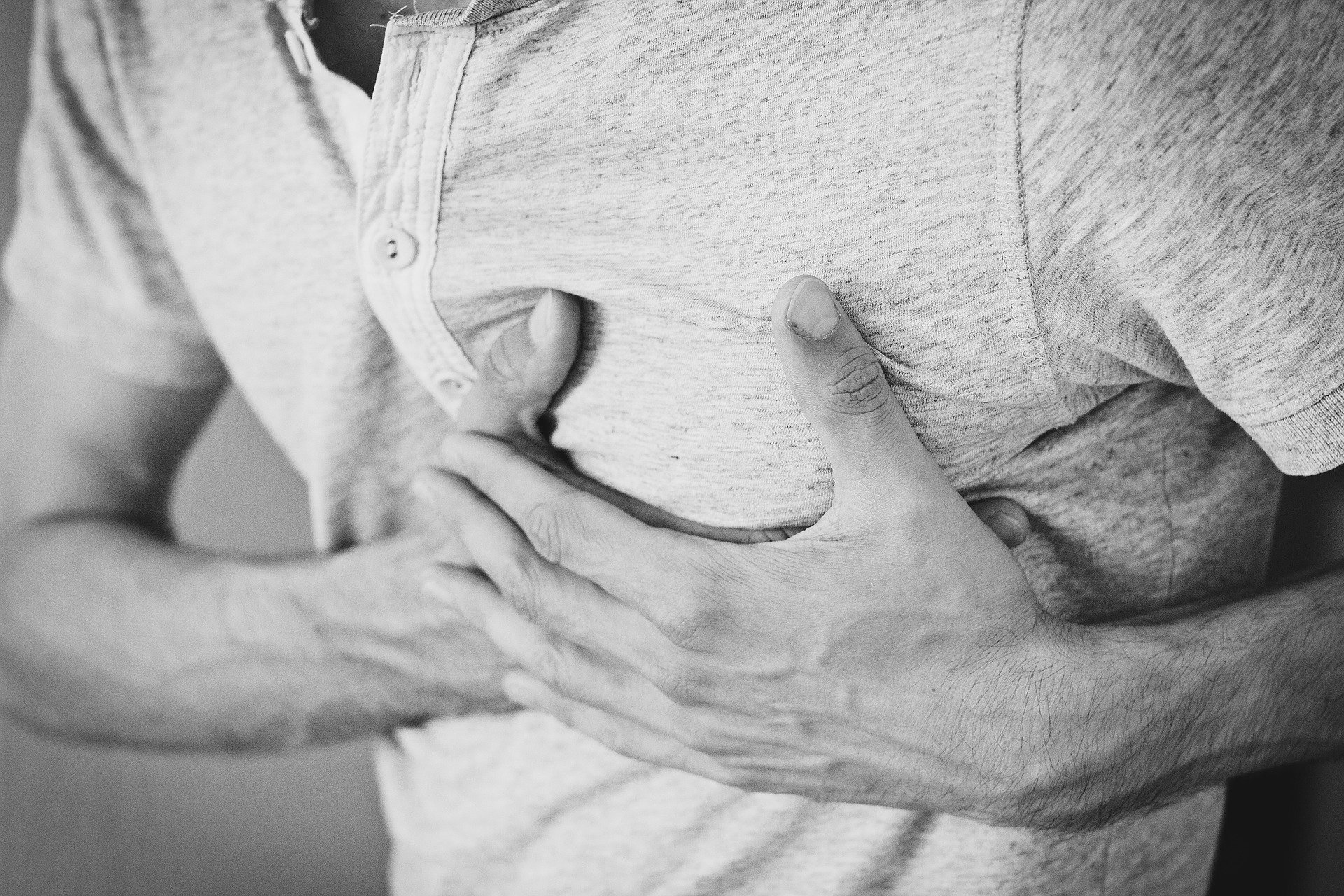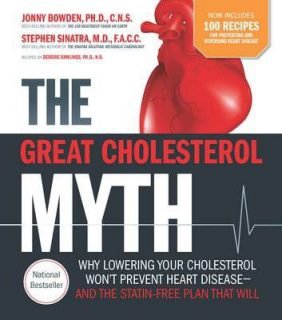We spoke to Jonny Bowden, Ph.D. CNS, about his latest book, The Great Cholesterol Myth, Revised and Expanded, co-authored with leading US cardiologist Stephen Sinatra, MD. An updated version of a first edition, it includes fascinating new research and clinical findings around heart health and cholesterol. Timely, not just because we’re living amid a global pandemic. But also because the authors are boldly challenging everything we’ve been told about the current HDL/LDL test.
Who is Dr. Jonny Bowden?
Dr. Jonny Bowden is an LA-based board-certified nutritionist. His own journey to health arose from a drug, alcohol, junk food, and tobacco addiction – coming “from hell to wellness nirvana” – and has resulted in him becoming something of an activist for healthy lifestyles.
Starting off as a personal trainer, he ultimately collected five major certifications from organizations such as NASM (National Academy for Sports Medicine), ACSM (American College of Sports Medicine). He also was recognised by ACE (American Council on Exercise). He also became Dean of the Equinox Fitness Training Institute.
It was during that time that he started questioning the conventional wisdom around low-fat diets.
So off he went, back to school. With a Ph.D. in holistic nutrition, he sat for the board exams in nutrition for the American College of Nutrition, earning board certification and the CNS (Certified Nutrition Specialist) designation from the College’s Certifying Board of Nutrition Specialists.
Since then, Bowden has written several books and columns and lectured around the world. His no-nonsense, myth-busting approach has also made him a popular guest on television (Dr. Oz, The Doctors, ABC-TV, MSNBC-TV, CNN, CBS-TV, CBN, Fox News, NBC-TV, and on morning shows across the US).
 Questioning conventional wisdom
Questioning conventional wisdom
Bowden’s thinking is controversial, but it’s also very relevant at this time. He has devoted a large chunk of his career to being unashamedly vocal about the myths around high cholesterol and its link to heart disease.
Why is this updated version of your original book so important right now – during a global pandemic?
“We want to set people straight on the subject of cholesterol and heart disease. And yes, we’re probably going to anger a lot of the conventional medicine crowd. However, we know a lot has changed in the medical establishment around the issue of cholesterol and heart disease since we first came together almost a decade ago to write the original version of The Great Cholesterol Myth. We wanted to share this, so everyone can take more control of their health outcomes, be empowered with better knowledge, and stretch their thinking when it comes to medication, diet, and lifestyle, and the impact on health.”
Who is most at risk right now and who should be reading this book?
According to Bowden, “You may be young, old, female, male, high-risk or on medication already. The reality is, there’s no one-size-fits-all when it comes to health. For example, we hear mostly about the risk of heart disease for men, and not nearly enough about the risk for women. What are the No 1 health fears for women? It’s breast cancer. And yet, what is the No 1 killer of women? It’s heart disease. Women present differently and this area is very under-researched. We have a different theory on heart disease..“
Sugar is making people sick
One of the greatest risks to heart health is sugar. For years the focus has been on cholesterol, but cholesterol is not even close to the top of the list. Sugar, however, is number one.
“I believe that authorities have, for too many years, been giving outdated and inaccurate dietary recommendations. We have more and more people with heart problems. Why? These people are often pre-diabetic, and virtually all suffer from insulin resistance syndrome. This is all related to eating too many bad carbs and sugar.
“We also have growing numbers of patients with Type 2 diabetes. Did you know that 80% of diabetics die of heart disease?”
 Bowden says the key COVID-19 risk factors (diabetes, hypertension, heart disease, and stroke) have one thing in common: insulin resistance. Insulin resistance is statistically related to conditions of the lungs, liver, and kidneys, other medical conditions associated with COVID-19 mortality rates.
Bowden says the key COVID-19 risk factors (diabetes, hypertension, heart disease, and stroke) have one thing in common: insulin resistance. Insulin resistance is statistically related to conditions of the lungs, liver, and kidneys, other medical conditions associated with COVID-19 mortality rates.
He believes people need to understand how dangerous insulin resistance is to their good health and longevity—and that it is treatable, preventable, and reversible with diet!
What you need to know
- Insulin resistance – pre-diabetes – is one of the strongest and most consistent predictors of heart disease.
- Insulin resistance happens when the body is no longer able to effectively manage its intake of sugar and starch.
- Studies going back to the 1970s show clearly that insulin resistance substantially increases the risk for many degenerative diseases.
- You can have insulin resistance as much as a decade before the other, more “conventional”, signs of heart disease show up, making it all the more important to test for insulin resistance.
- Preventing, reversing, or treating insulin resistance may be one of the most effective ways yet discovered to prevent heart disease.
Stop looking at cholesterol
Bowden says cholesterol has been given a bad rep unfairly. “We all need cholesterol for immunity. We can’t take cholesterol out of our bodies. Instead of focusing on correcting the real causes of heart disease and remedying them, we throw medication at it. Statins are given to anyone deemed to be at risk, in a one-size-fits-all approach.
“My heart breaks when I hear how many people are on statins who don’t need to be on them. Half of the American men are on statins, and we have an epidemic of erectile dysfunction. Dr. Sinatra and I don’t think they’re unrelated.”
Insulin resistance is treatable and reversible
Bowden says the key to better health is to start looking at insulin resistance, rather than cholesterol. Insulin resistance is preventable, treatable, and reversible.
“I believe, if we can fix insulin resistance, we’re all going to be at lower risk of heart disease. In fact, studies we quote in the book predict that we could prevent 42% of heart attacks if we treated insulin resistance properly.”
But even if it seems like a simple fix, it doesn’t mean it’s easy.
“The good news is that we have all kinds of cool ways of measuring sophisticated risk factors that most people had never heard of a decade or two ago. Ten years ago, for example, few people knew about (much less understood) the microbiome, a whole ecological system of microbes that lives in our gut and profoundly affects so many areas of our health. Even genetic testing, still in its infancy, is nonetheless light-years ahead of where it was in the early days of 23andMe.
Cardiac markers
“There are now at least a dozen cardiac markers that we can test that influence the likelihood of heart disease. And, best of all, many of these risk factors can be strongly modified by our own life choices.
“Every year we meet more and more physicians at conferences who are realizing the importance of inflammation and oxidation in making arteries vulnerable to plaque. Every year we meet more and more physicians who have come around to the notion that nutrition and diet can be powerful allies in the fight against heart disease (and not, as previously believed, by sticking to a low-fat diet).
 “The connection between diabetes and heart disease is the central thesis of this book. Insulin resistance is something that nearly always precedes Type 2 diabetes, and, as we will argue, is an early warning sign of heart disease. Understanding insulin resistance – and how to prevent, treat, and even reverse it – is one of the most important things you can do if you want to prevent heart disease.
“The connection between diabetes and heart disease is the central thesis of this book. Insulin resistance is something that nearly always precedes Type 2 diabetes, and, as we will argue, is an early warning sign of heart disease. Understanding insulin resistance – and how to prevent, treat, and even reverse it – is one of the most important things you can do if you want to prevent heart disease.
“We’ve all heard of pre-diabetes, but we suggest that ‘pre-heart disease’ is just as real a phenomenon, and that phenomenon is diabetes. We argue that if you catch the signs of diabetes early enough, you can prevent heart disease – for many, if not most, people.”
What drugs are you on and do you really need them?
Bowden says that most doctors are still prescribing powerful drugs for a condition known as “high cholesterol”, which is a lab test, not a disease, and – to add insult to injury – “cholesterol” is being measured in an antiquated way which is long past its usefulness. “Unfortunately, for all of us, a very high percentage of doctors practicing conventional medicine in the United States still think an LDL cholesterol reading of more than 100 is a big problem. They’ll reach for their prescription pad the moment it creeps north of 129.
“A very high percentage of doctors practicing conventional medicine in this country also continue to believe that fat and cholesterol clog your arteries, that obesity is caused by eating too much fat, that low-fat diets are generally effective, and that cholesterol causes heart disease. All of which tells us we’ve got a heck of a lot more work to do. Many doctors continue to cling to the old technology, an antiquated method of classifying cholesterol into large gross categories of ‘good’ and ‘bad’. We now know that there are over a dozen different categories of cholesterol, that lipoproteins come in different sizes and numbers, and that all that matters greatly for predicting risk. And we can test for every one of those things, but the old-fashioned “good” vs “bad” cholesterol test tells us none of them.
“Worse, these same doctors are prescribing powerful drugs – statins – based almost entirely on the read-out from a test that should have been dumped in the dustbin of out-of-date medical ideas a long time ago.”
Why we need saturated fat
Bowden explains: “Fat, especially saturated fat, decreases the amount of the small, dense LDL particles—the worst kind– while the widely recommended low-fat diet increases their number. The opposite of the small, dense LDL particles are large, fluffy LDL particles, which are just not that harmful and may even have some benefits. But the LDL-lowering drugs lower those, too.”
How did this happen in the first place?
“Sixty years ago, a researcher, little known outside of academic circles, singlehandedly set us on this path of cholesterol paranoia. Ancel Keys, Ph.D., a proponent of what has become known as the lipid hypothesis, concluded that excess cholesterol caused heart disease. He started out thinking that dietary fat, in general, drove cholesterol levels up, but as the years went by, he came to believe that saturated fat was the true cholesterol-raising villain. (This idea of saturated fat as a villain is so ingrained in the minds of health writers that the words ‘saturated fat’ are almost never written alone, but always preceded by the descriptor “artery-clogging.”)
“Nice and simple, but not true. It has never been proven, which is why it’s still called the lipid hypothesis. Because of Keys’s influence, when a study showed that, of almost 140 000 patients admitted to the hospital for heart disease, almost half of them had LDL levels under 100mg/dL (100mg/dL has been the therapeutic target for LDL for the past few years), instead of stepping back, scratching their heads and thinking, hmmm, maybe we’re on the wrong track here, the authors of this study doubled down and concluded that the current standard of 100mg/dL for LDL is still too high, and needs to be even lower.” (If Pharma manages to get the recommended levels lowered, they instantly produce millions of more statin customers, all of which will be paid for by insurance, despite the fact that statins don’t save lives- although they do lower cholesterol.)
Get the right test
“Lowering cholesterol, as the 30-odd studies before 1990 showed, accomplished nothing (except, of course, to lower cholesterol).”
Bowden believes, if there’s a benefit to statin drugs at all, it has to come from something other than their ability to lower cholesterol.
“Now, one might reasonably argue, so what? Suppose you’re right that the ability of statin drugs to lower cholesterol is irrelevant, but suppose they do a lot of good anyway? Why not just use them for their other benefits?
“Good question. But to answer it, we need to know two things: just how great a benefit are we actually talking about, and what are the side-effects? In simple terms, we’d want to know the same things we’d want to know about a financial investment: what are we risking versus what are we getting?
The brain
“Statin drugs don’t stop at just lowering cholesterol in the blood; they also lower it in the brain. And that’s not good news, because the brain absolutely depends on cholesterol to function at its best. Although the brain makes up only about 2% of the total weight of the body, it contains 25% of the body’s cholesterol.”
Bowden confirms in his book that good and bad cholesterol have a number of different components (or subtypes), which behave quite differently.
“The 21st-century version of a cholesterol test should always tell you exactly which subtypes you have and, most important, your total number of particles. Anything less than this up-to-date test – sometimes called the NMR particle test or the NMR Lipo-Profile panel – is not particularly useful and should never be the sole basis on which a treatment plan or a statin drug is recommended.”
 Particle size test (the NMR Lipo-Profile test)
Particle size test (the NMR Lipo-Profile test)
Although LDL cholesterol is known as the “bad” cholesterol, it comes in several shapes and sizes, as does HDL cholesterol, the so-called “good” kind. These different subtypes of cholesterol behave very differently. Seen under a microscope, some LDL particles are big, fluffy, and much less likely to do any damage. Some are small, dense, “angry”, and much more likely to become oxidized and inflamed, slipping through the cells that line the walls of the arteries (the endothelium) and beginning the inflammatory cascade that leads to heart disease.
“Tests are now available that measure LDL particle size and total particle number, and that’s the information you really want to have. If you have a pattern A cholesterol profile, most of your LDL cholesterol is the big, fluffy kind, but if you have a pattern B profile, most of your LDL cholesterol is composed of small, dense, atherogenic particles that cause inflammation and ultimately plaque. (Pattern B is much more likely to be associated with insulin resistance and metabolic syndrome.)”
One of the best-known and most established particle tests is known as the NMR Lipo-Profile.
“Fortunately, you can change the distribution from small to buoyant by following the dietary and supplement recommendations in this book. Taking a statin drug, or any other medication, based solely on the standard cholesterol test is a really bad idea.”
The role of cholesterol
“Cholesterol is a vital part of cell membranes in the brain, and it plays a critical role in the transmission of neurotransmitters. Without cholesterol, brain cells can’t effectively ‘talk’ to one another, cellular communication is impaired, and cognition and memory are significantly affected, usually not in a good way.
“Cognitive and memory problems are one of the most dramatic and frequent side-effects of statin drugs, and a 2009 study from Iowa State University demonstrates why. Yeon-Kyun Shin, Ph.D., a biophysics professor in the Department of Biochemistry, Bio-Physics and Molecular Biology, tested the whole neurotransmitter machinery of brain cells in a novel experiment. (Neurotransmitters affect data-processing and memory functions in the brain.)
![cholesterol [longevity live]](https://longevitylive.com/wp-content/uploads/2019/08/blur-cholesterol-close-up-6420-320x213.jpg) The results of his study show that drugs that inhibit the liver from making cholesterol may also keep the brain from making cholesterol, which is vital to efficient brain function.
The results of his study show that drugs that inhibit the liver from making cholesterol may also keep the brain from making cholesterol, which is vital to efficient brain function.
The brain needs high-density lipoprotein
“If you deprive cholesterol of the brain, then you directly affect the machinery that triggers the release of neurotransmitters,” reported Shin. “Neurotransmitters affect data-processing and memory functions. In other words — how smart you are and how well you remember things.”
Shin’s findings were published in the journal Proceedings of the National Academy of Sciences of the United States of America.
Cholesterol is one of the building blocks of cells and is made in the liver. Low-density lipoprotein (LDL) — often referred to as bad cholesterol — is cholesterol in the bloodstream from the liver on the way to cells in the body. High-density lipoprotein (HDL) — so-called good cholesterol — is cholesterol being removed from cells. Too much LDL going to cells and not enough being removed can lead to cholesterol deposits and hardening of the cells.
With that in mind, let’s take a look at the side-effects of statin drugs you probably don’t know about.
What should we know about statins? It’s a complex issue and not everyone is confident or knowledgeable enough to challenge their specialist?
The benefits of statin drugs have been widely exaggerated and any benefit of these drugs has little to do with their ability to lower cholesterol.
- Statin drugs deplete coenzyme Q10, one of the most important nutrients for the heart. Depletion of CoQ10 can cause muscle pain, weakness, and fatigue.
- Sexual dysfunction is a common (but under-reported) side-effect of statin drugs.
- There are troubling indicators that statin drugs may be associated with a higher risk for cancer and diabetes.
Bowden adds that his co-author, Dr. Sinatra, will frequently prescribe a low-dose statin drug for people in a specific population: middle-aged men who have already had a heart attack or have documented coronary artery disease.
Statins for who?
“Both of us believe there is no other good use for statin drugs. There is virtually no good evidence to support their use in women; they do not need to be prescribed for people who have not had a heart attack; and they definitely – emphatically, positively – should not be prescribed for children. We want to clarify this position again, partly to help counteract the enormous lobbying efforts of pharmaceutical companies, which, as of this writing, are working tirelessly to expand the market for statin drugs to include children.
“In The End of Illness, author David Agus, MD, recommends that everyone in the country be on a statin drug. Agus is well-meaning but completely wrong. His idea, if accepted, maybe the next medical disaster is just waiting to happen. The antioxidant and blood-thinning effects of a low-dose statin may afford some degree of protection in extremely vulnerable men who have had a previous heart attack or moderate-to-severe coronary disease. For anyone else, proceed with caution!”
The lowdown
Dr. Jonny Bowden is living proof that you can turn your health and life around. He has just turned 74 and plays two hours of tennis a day. He concludes: “Life can be great. Pay attention now. Figure out your eating and exercise. It actually isn’t as difficult as you think. If you don’t, you’ll be sitting in a wheelchair, walking with a stick, and on a list of drugs super-long.”
Dr. Jonny Bowden suggests:
Eat less of these:
-
Sugar
-
Soda
-
Processed carbs
-
Trans fats
-
Processed meats
-
Excess vegetable oils
Eat more of these:
-
Wild salmon
-
Berries and cherries
-
Grass-fed meat
-
Vegetables
-
Nuts
-
Beans
-
Dark chocolate
-
Garlic and turmeric
-
Pomegranate juice
-
Green tea and red wine



 Particle size test (the NMR Lipo-Profile test)
Particle size test (the NMR Lipo-Profile test)

![women [longevity live]](https://longevitylive.com/wp-content/uploads/2020/01/photo-of-women-walking-down-the-street-1116984-100x100.jpg)










